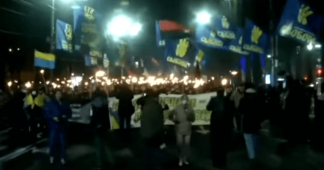By David North
This article was originally posted on Twitter.
An article, posted today online and printed in the New York Times Sunday Magazine, is yet another deplorable example of Professor Timothy Snyder’s role as a historical falsifier and apologist for Ukrainian fascism.
Snyder mockingly dismisses Russian references to Ukrainian nationalists’ mass murder of Poles and Jews during World War II as “a past that never happened” and “nonsensical and necrophiliac accounts of history.”
But at an earlier stage of his career, Snyder wrote detailed accounts of the genocidal activities of the Organization of Ukrainian Nationalists (OUN). His article, “The Causes of Ukrainian-Polish Ethnic Cleansing 1943,” appeared in the May 2003 edition of Past and Present.
This article, posted today on-line and printed in the NY Times Sunday Magazine, is yet another deplorable example of Professor Timothy Snyder's role as a historical falsifier and apologist for Ukrainian fascism. 1/ https://t.co/1D8dWZTliW
— David North (@DavidNorthWSWS) April 24, 2022
This 37-page scholarly article focused on the OUN’s mass killing of Poles in Volhynia. The OUN’s military wing, the Ukrainian Insurgent Army [UPA], wrote Snyder, “killed about fifty thousand Volhynian Poles and forced tens of thousands to flee in 1943.”
“By the end of April 1943,” according to Snyder’s account, “the UPA had perhaps ten thousand soldiers under its command, and had reduced much of Volhynia to mutual slaughter.” Snyder continued:
“Throughout April and throughout Volhynia, UPA soldiers surrounded colonies and villages, burned houses, shot or forced back inside those who tried to escape.
In mixed settlements, the UPA’s security services warned Ukrainians to flee by night, then killed everyone remaining at dawn. This was a co-ordinated attack by armed men upon a leaderless and disorganized population.”
This was not Snyder’s only “necrophiliac account” of mass murder by Ukrainian nationalists. In an article published in February 2010 in the New York Review of Books, Snyder explicitly denounced then Ukrainian President Viktor Yushchenko’s cover-up of OUN crimes.
“When the Wehrmacht invaded the Soviet Union that June [in 1941], they were joined by the armies of Hungary, Romania, Italy, and Slovakia, as well as small contingents of Ukrainian volunteers associated with the OUN-B.
“Some of these Ukrainian nationalists helped the Germans to organize murderous pogroms of Jews. In so doing, they were advancing a German policy, but one that was consistent with their own program of ethnic purity, and their own identification of Jews with Soviet tyranny.
“Under their command, the UPA undertook to ethnically cleanse western Ukraine of Poles in 1943 and 1944. UPA partisans murdered tens of thousands of Poles, most of them women and children. Some Jews who had taken shelter with Polish families were also killed.”
Snyder now dismisses references to Ukrainian fascism as Russian propaganda. But in the 2010 essay, he wrote that the Soviet description of “German-Ukrainian fascists” was “accurate enough to serve as enduring and effective propaganda both within and without the Soviet Union.”
For reasons he has never explained, in the months between the February 2010 article in the New York Review of Books and the October 2010 publication of Bloodlands, Snyder radically changed his account of Ukrainian history.
The activities of the OUN totally disappeared from the fictionalized and viciously anti-Soviet narrative that he presented in Bloodlands. Snyder had shifted from writing history to producing propaganda for the United States’ anti-Russia policy.
In The Russian Revolution and the Unfinished Twentieth Century, I devoted a chapter to an evaluation of Bloodlands. It can be accessed here.
I wrote: “In the work of Timothy Snyder we are confronted with an unhealthy and dangerous tendency: the obliteration of the distinction between writing history and manufacturing propaganda.” This appraisal, written in 2014, has been thoroughly vindicated
We remind our readers that publication of articles on our site does not mean that we agree with what is written. Our policy is to publish anything which we consider of interest, so as to assist our readers in forming their opinions. Sometimes we even publish articles with which we totally disagree, since we believe it is important for our readers to be informed on as wide a spectrum of views as possible.











